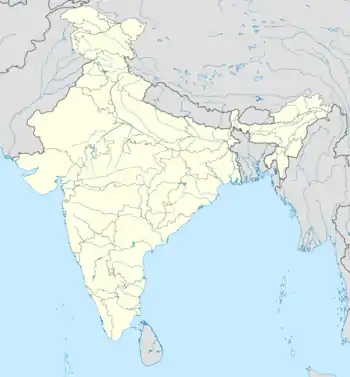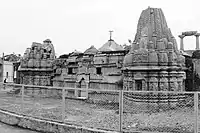Siddhpur
Siddhpur, also spelled Sidhpur is a town, municipality and Sidhpur taluka headquarter in Patan district in the Indian state of Gujarat. It is a historical place located on the bank of the endorheic Sabarmati River,[1] which is probably a remaining of the ancient Sarasvati River.
Siddhpur
Sidhpur | |
|---|---|
City | |
 Ruins of Rudra Mahalaya temple | |
 Siddhpur Location in Gujarat, India  Siddhpur Siddhpur (India) | |
| Coordinates: 23.9167°N 72.3833°E | |
| Country | |
| State | Gujarat |
| District | Patan |
| Named for | Jayasimha Siddharaja |
| Population (2011) | |
| • Total | 61,867 |
| Languages | |
| • Official | Gujarati, Hindi |
| Time zone | UTC+5:30 (IST) |
| PIN | 384151 |
| Telephone code | 02767 |
| Vehicle registration | GJ-24 |

History
Siddhpur was historically known as Sristhal,[2] literally "a pious place".
The bard sings of it,[2]
Tirath bhumipavan Siddhakshetra subhasar,
Nirmal nir vahe Sarasvati sada mokshko dwar, ... —
"A Tirtha, a place to make holy, is the good Siddha Kshetra,
Where flows Sarasvati's pure stream — ever beatitude's door.
A city three worlds to purify, by Siddhs ever worshipped,
Gods, Rishis, and men cherish the desire to live there.
And there dwell devas unnumbered, as a tirtha regarding it, —
Of Kasi, Gaya, Godavari, and all other tirthas, the best ;
Where Kardam and Dehuti lived, and Kapila was born.
Here is Bindusarovar's pure fount, and Matrugaya;
Applied to the bodies of men degraded and fallen, it washes their myriads of sins.
Here is Prachi Mahadev, whose renown by Veda and Purana is sung:Of all Tirthas, the essence — it is named Kapilashram."
In tenth century (943 AD), Mularaja, the founder of Chaulukya dynasty, started constructing the Rudra Mahalaya Temple.[2] On completion of the temple, around 1140 AD, Jayasimha Siddharaja consecrated it and established the town as his capital. He changed its name to Siddhpur, literally Siddhraj's town.[2] The temple was dismantled by an army under Almas Beg (Ulugh Khan) and Nusrat Khan sent by Alauddin Khalji in 1298–99.[2]
During the Gujarat Sultanate, the town was under the rule of local dynasty ruling from Palanpur. In the 15th century, the town was brought under the Mughal rule by Akbar. Under the Mughal rule the Hindu heritage of the town deteriorated further and the Rudramahalaya temple fell into ruins.
Asaita Thakar, traditionally credited for the origin of traditional folk theatre Bhavai, in 14th century, lived in Siddhpur.[3]
Architecture
The Dawoodi Bohras, a trading community, flourished in Sidhpur from the 1820s to the 1930s.[4] They built monumental mansions, made of wood, with stuccoed facades, ornate pilasters, trellised balconies and gabled roofs which have become identifying features of the architecture of this town.[4] The façades of these houses are in a hue of pastel colours - pink, lilac, lime green, peach, lemon, beige and the like and every house façade has an intricate monogram with the initials of the owners (in Latin text).[5] Sebastian Cortés has captured detailed photographs of these architectural marvels which were displayed at an exhibition in Mumbai, India.[6] On Sidhpur, Cortés said, "I would feel safe to say that it incorporates elements that span from neoclassical European, including art nouveau, and touching Indian Gothic. But if you begin to look closely, you can find other influences; this variety makes Sidhpur a marvel for the eye."[4]
Demographics
At the 2001 census of India,[7] Siddhpur had a population of 53,581, of which 52% were male and 48% female. Siddhpur had an average literacy rate of 71%, higher than the national average of 59.5%: male literacy was 77%, and female literacy was 64%. In Siddhpur, 12% of the population is under 6 years of age.
Places of interest
 Ruins of Rudramahal
Ruins of Rudramahal.jpg.webp) Bindu Sarovar (Matrugaya)
Bindu Sarovar (Matrugaya) Havelis (mansions) of Dawoodi Bohra community
Havelis (mansions) of Dawoodi Bohra community Clock Tower
Clock Tower_Siddhpur_03.jpg.webp) Shristhal Sangrahalay (Siddhpur Museum)
Shristhal Sangrahalay (Siddhpur Museum)
- Sidhpur has two protected national monument under Archaeological Survey of India (ASI) namely: Ruins of Rudra Mahalaya Temple and the Jami Masjid.[8]
- Bindu Sarovar: It is a small artificial tank, even mentioned in Rig-veda and considered pious by Hindus. According to Hindu theology, there are five sacred lakes; collectively called Panch-Sarovar; Mansarovar, Bindu Sarovar, Narayan Sarovar, Pampa Sarovar and Pushkar Sarovar.[9] They are also mentioned in Shrimad Bhagavata Purana.[9] It is the only place where Matrushraddh, Shraddh ritual for mothers, is performed thus thousands of people visit it annually to perform the rituals for their dead mothers, in Kartika month of Hindu calendar.
- Bohra havelis (mansions) in European influenced architecture are largely belonging to Dawoodi Bohra trading community and spread over 18 mohallas or neighbourhoods in Najampura and Hassanpura.[10][11] They are known for their wooden architecture and interior decoration.[12][11][13]
- Arvadeswar Shiva temple is an ancient place of Natha Sampradaya.
- Clock Tower, built by Bohra businessman Muhammadali Hararwala at the cost Rs. 15000, inaugurated on 4 April 1915, during the rule of Gaekwad.
- Shristhal Sangrahalay (Siddhpur Museum)
Politics
Sidhpur is a constituency of the Gujarat Legislative Assembly within the Patan (Lok Sabha constituency).[14]
Transport
See also
References
- "Saraswati River". guj-nwrws.gujarat.gov.in, Government of Gujarat. Retrieved 13 March 2012.
- Burgess; Murray (1874). "The Rudra Mala at Siddhpur". Photographs of Architecture and Scenery in Gujarat and Rajputana. Bourne and Shepherd. p. 19. Retrieved 23 July 2016.
 This article incorporates text from this source, which is in the public domain.
This article incorporates text from this source, which is in the public domain. - Amaresh Datta (1987). Encyclopaedia of Indian Literature: A-Devo. Sahitya Akademi. p. 236. ISBN 978-81-260-1803-1.
- "Sidhpur: Waking the Sleeping Beauty of Gujarat". Your Site NAME Goes HERE. Retrieved 2020-02-21.
- 100cobbledroads (2018-02-08). "Have you heard of the mysterious mansions of Sidhpur?". 100cobbledroads.com. Retrieved 2020-02-21.
- "In Photos: The Magnificent Mansions of the Bohras of Sidhpur". Your Site NAME Goes HERE. Retrieved 2020-02-21.
- "Census of India 2001: Data from the 2001 Census, including cities, villages and towns (Provisional)". Census Commission of India. Archived from the original on 2004-06-16. Retrieved 2008-11-01.
- Alphabetical List of Monuments - Gujarat. Rudra Mahalaya Temple is a unique place to visit to see the spectacular crafts on sandstones but as the issue is pending in court about the religious authority, the entry is restricted in the area of Rudra Mahalay. Archaeological Survey of India.
- Encyclopaedia of tourism resources in India, Volume 2 By Manohar Sajnani
- "Ghost town of Gujarat". Indian Express. 29 June 2003. Retrieved 25 January 2013.
- Burte, Himanshu (2014-08-26). "Bohra ghost towns of Gujarat". Outlook Traveller. Retrieved 2019-10-21.
- Saumya, Ancheri (2015-03-20). "In Photos: The Magnificent Mansions of the Bohras of Sidhpur". National Geographic Traveller India. Retrieved 2019-10-21.
- https://www.business-standard.com/article/specials/photo-exhibition-wonder-world-of-sidhpur-s-bohra-mansions-115040200805_1.html
- "Gujarat election results: List of winners". Jagran Post. 20 December 2012. Retrieved 25 January 2013.
External links
 Media related to Sidhpur at Wikimedia Commons
Media related to Sidhpur at Wikimedia Commons